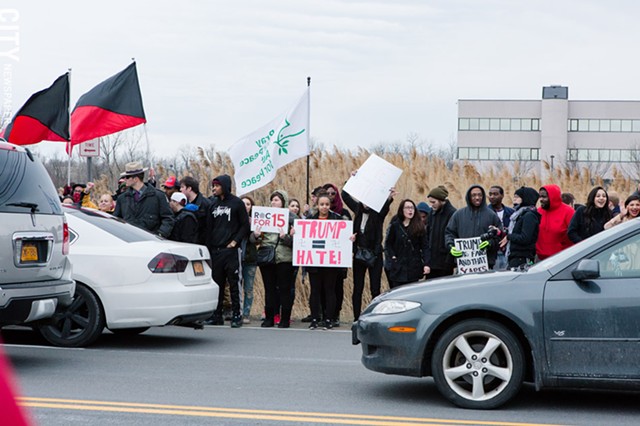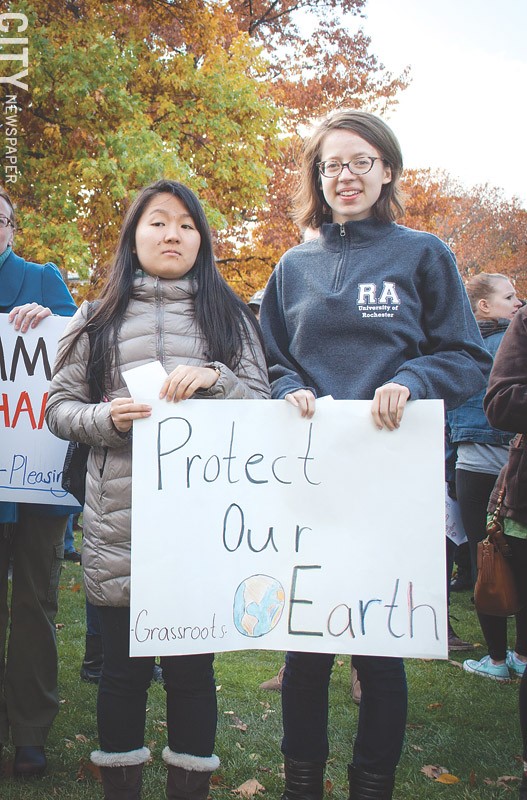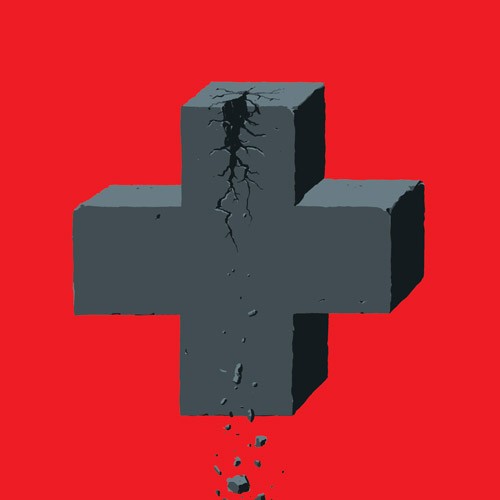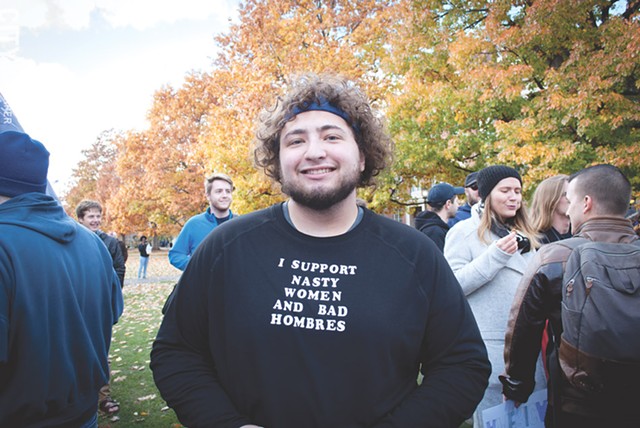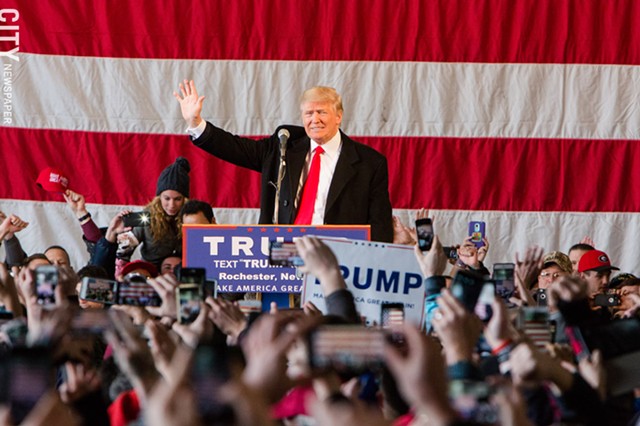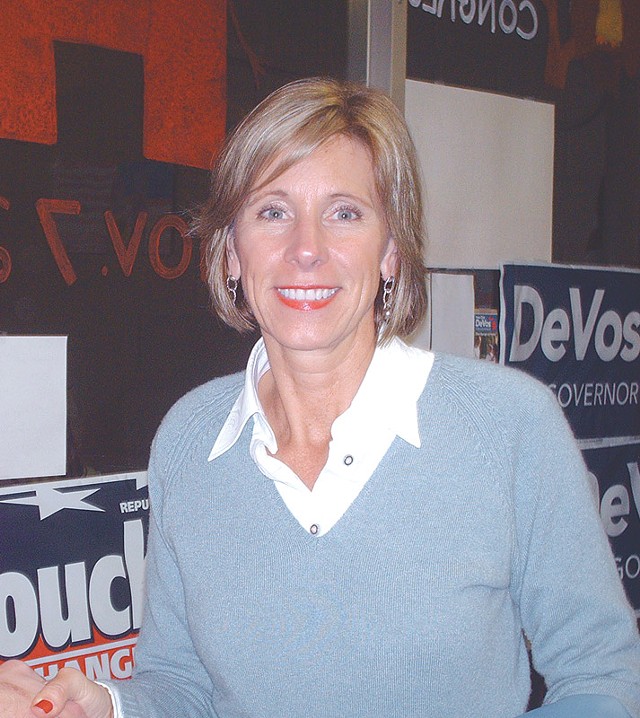
[
{
"name": "500x250 Ad",
"insertPoint": "5",
"component": "15667920",
"parentWrapperClass": "",
"requiredCountToDisplay": "1"
}
]
The House GOP's attempt to gut Congress's independent ethics office as its first act of the new session, as well as Republicans' gleeful pronouncements about undoing the Affordable Care Act and defunding Planned Parenthood are clear examples of the threats posed by President Donald Trump and a Republican-controlled House and Senate to the health and well-being of millions of Americans.
Has there ever been a more urgent time to work for progressive goals?
It's impossible to know what to expect from a Trump presidency; his positions change from breath to breath. That in itself is dangerous given the grave domestic and global challenges his administration will face when it takes over on January 20, from the growing impact of climate change — which Trump dismisses — to saber-rattling by North Korea.
But a fair look at Trump's public record shows a man who is completely devoted to self-enrichment and entirely detached from reality: a 2 a.m. Twitter troll weighed down by myriad conflicts of interest, unpaid debts, a bizarre bromance with Russian leader Vladimir Putin, shady business dealings, a fraudulent university, an easily provoked ego, and a gross overestimation of his own knowledge and abilities.
His hateful rhetoric throughout the campaign emboldened racists and others of similar ilk to unleash their vitriol openly and proudly, and frayed the already perilously thin margins of society where so many people of color, the disabled, LGBTQ individuals, and other Americans reside.
There is no reason to hope that Trump will miraculously discover a higher purpose, a code of honor, or a latent sense of duty once he's sworn in.
The call to arms is broad; progressives must be aware and active at all levels of government.
New York is thought of as a progressive state, but it wouldn't take much for state government to fall under the control of the far right, which could undo the progress that New York has made or could make on minimum wage, clean energy, child care, affordable tuition, and paid family leave.
The next four years will be rough, but you must not give up. You must remember that at the heart of progressivism is the unshakeable belief that everyone is equal, everyone deserves a fair shot, and everyone plays by the same rules.
We believe that every woman has the right to self-determination, including the right to decide when she has children.
We believe that the earth is warming, humanity is to blame, and that Republicans' denial of overwhelming scientific evidence is ignorant, petulant, and self-serving.
We believe that health care is a human right and that to deny services based on ability to pay is an affront to the dignity of all.
We believe that poverty is a cruel affliction and not a character flaw.
We believe that LGBTQ people are people and we will stand with them against any attempts to restrict their rights.
The only battle you lose is the one you stop fighting; don't stop fighting. Vote. Go to government and community meetings. Read multiple, credible news sources. Agitate. Run for office and encourage others to run. Volunteer. Stand up when you witness attempts to demean or harass others based on their skin color, religion, gender, sexual identity, or for any reason. Establish a relationship with your elected representatives: they'll assume everything's O.K. unless you tell them otherwise. Mentor a young person. Check out the list of local activist organizations on CITY's website, www.rochestercitynewspaper.com, and get involved.
On the cusp of Trump's inauguration, CITY writers Jeremy Moule, Tim Louis Macaluso, Jake Clapp, Christine Carrie Fien, Mary Anna Towler, and Rebecca Rafferty discuss some of the issues they're most concerned about under a Trump presidency, what to watch out for, and what you can do.
An anti-environment agenda
President-elect Trump talks about the war on coal as if it's a bad thing, wants to withdraw the US from international climate action efforts, and picked oil industry execs and their statehouse lackeys for key cabinet posts.
During the campaign, Trump pledged to unleash domestic gas and oil production while reviving the coal industry. He vowed to eliminate, roll back, or cripple Obama administration programs and regulations intended to cut climate-altering carbon emissions. And he said he'd approve the Keystone XL and Dakota Access pipelines.
And let's not forget that Trump once called global warming a hoax invented by the Chinese. He's unwilling to accept the overwhelming scientific consensus that human-influenced climate change is real and an urgent problem.
These are bad, bad signs if you care at all about the environment, climate change, nature, or breathing without choking. Trump and his cabinet present an overwhelming threat to the environment and will undoubtedly work hand-in-hand with the like-minded House and Senate Republican majorities. (To give credit where it's due, Trump and the GOP favor greater investment in drinking water infrastructure.)
But this is not the time to give up. Activists, parents, grandparents, socially conscious businesses, environmentally aware politicians, engineers, professionals, scientists, and practically anyone who cares even a little bit about any environmental issue need to band together.
This is a time to build upward pressure. It's time to be relentless and to show government leaders that there will be consequences if they fail to protect the environment and to act on climate change.
We see this all the time at the local level: town and village boards get reshaped or replaced because of one vote on a budget, a development, a library, and so on.
In fact, start there. Find neighbors who are concerned about climate change, for example, and start pressing your local elected officials; local groups such as Mothers Out Front, the Sierra Club, Citizens' Climate Lobby, and the Rochester People's Climate Coalition should be able to help.
Demand that your town board or city council take a stand on oil trains, build bike- and pedestrian-friendly streets, and act on climate; many municipalities in New York are already greening their vehicle fleets, cutting energy use, and buying electricity from renewables.
If your officials refuse, run against them or help someone who's running against them.
And then keep doing this up the chain. Press county officials and state legislators, particularly Republicans; try to convince local officials to do the same with members of their party who hold higher office.
Environmental protections have never come easy and they've rarely been implemented without public agitation, regardless of the party or people in power. Yes, this is maddening and wrong, but it's the reality.
Rachel Carson's expose on DDT, "Silent Spring," was published in 1962 and the public soon began showing concern about the chemical. But the federal government took a full decade to ban the toxic pesticide.
New York officials blocked high-volume fracking in 2015, but only after several years of review and incredible, unyielding pressure from state residents (as well as the elected officials representing them).
State and local governments are the best defense against Trump and the congressional GOP and the best hope for addressing crucial environmental issues. New York and California have, historically, led the way on major environmental reforms, especially around consumer goods; vehicle emissions are a well-known example.
New York officials approved a strong renewable energy requirement for state utilities and passed substantial incentives for residential solar power systems, as well as for hybrid and electric vehicles. Governor Andrew Cuomo included funding for hundreds of electric vehicle charging stations across the state in his 2017 budget proposal.
Cuomo is also calling for a tighter limit on power plant carbon emissions through the Regional Greenhouse Gas Initiative, a cap-and-trade partnership between several Northeast states.
And State Attorney General Eric Schneiderman is leading a coalition of state attorneys general who have vowed to fight any Trump administration efforts to roll back Obama's climate initiatives.
There is hope for the environment and the climate, but pushing back against the Trump administration and the congressional GOP will take dedication and aggressive, back-to-basics, block-by-block, take-nothing-for-granted organizing and agitating. BY JEREMY MOULE
Health care's uncertain future
The Affordable Care Act survived a Supreme Court challenge and more than 60 attempts to repeal it during Obama's presidency — costing taxpayers an estimated $87 million. But its luck has run out.
Congressional Republicans are finally getting their wish and dismantling the law, putting roughly 20 million Americans at risk of not having health care. And they're combining that with a virulent assault on women's reproductive rights with the ultimate goal of criminalizing abortion – something that President Donald Trump said that he supports during the campaign.
Contrary to Republicans' claims, polls show that most Americans want the ACA improved rather than repealed, and they don't want it repealed without a replacement policy that can be reviewed in advance.
Instead, Americans are being told to hold their breath.
Despite the right's negative drumbeat, the number of uninsured Americans has dropped consistently under the ACA to 11.9 percent in 2016 for 18- to 64- year olds and 8.6 percent overall — or 27 million people. That's down from nearly 16 percent or more than 48.6 million in 2010, according to a recent CNBC report.
The nation's health care policy prior to the ACA was failing Americans. A 2001 Harvard University study tracking bankruptcies in five states concluded that about 46 percent of all bankruptcy filings involved high medical debt. Senator Elizabeth Warren is a co-author of the study.
Women's health is in a particularly precarious spot under the Trump administration. Republicans' rush to defund Planned Parenthood will increase public health spending by $130 million, according to a recent New York Times article. Women will have less access to preventive care such as cancer screenings, especially in rural areas where there are few medical facilities, and in facilities where Medicaid is not accepted.
And restricting access to birth control will result in more unplanned births, which will increase Medicaid and welfare spending, the Times story says.
There are things that progressives can do to fight back. They must tell Democratic leaders in the Senate and House to firmly reject a Trump plan that isn't comparable or better than the ACA, because that's what Trump promised. And they can't be fooled by gimmicks.
The Republican proposal to eliminate the "individual mandate" would send premiums skyrocketing as healthier and younger individuals leave the insurance pool. And their talk of turning health care over to individual states and relying on marketplace principles also raises alarm bells. A multi-tiered system that reserves higher quality care for those who can afford to pay would amount to rationing health care.
And progressives in New York State, specifically, can't be complacent about protecting women's access to reproductive health care. State lawmakers passed nine out of Governor Andrew's Cuomo's 10 bills in his Women's Equality Act, but the bill to protect women's reproductive health and access to legal abortions by essentially integrating Roe v. Wade into state law failed to pass.
In this political climate, women's reproductive health in New York is vulnerable unless the WEA is expanded.
Progressives should support New York Attorney General Eric Schneiderman's Comprehensive Contraception Coverage Act, which would protect New Yorkers' access to cost-free contraception if the ACA is repealed.
And they should continue to fight for single-payer universal coverage because it would uncouple health care from employers and sharply reduce administrative costs, supporters say.
Progressives must recognize that the threat that Trump and Republicans pose to health care, including entitlements, is real. Even though Trump promised in his campaign that he would not cut Social Security, Medicare, and Medicaid — he's given us little reason to believe him. BY TIM LOUIS MACALUSO
Trump's immigration fearmongering
Immigration has been a central piece of Donald Trump's platform from the beginning. The world's introduction to Trump as a presidential candidate — gliding down an escalator with Neil Young's "Rockin' in the Free World" blaring in the background — included Trump's infamous disparagement of Mexican immigrants.
"When Mexico sends its people, they're not sending their best," he said, as if human migration is a coordinated government plan. "They're sending people that have lots of problems, and they're bringing those problems with us (sic). They're bringing drugs. They're bringing crime. They're rapists. And some, I assume, are good people."
It's this kind of sweeping generalization and racist stereotyping that hinders real, needed immigration reform — but it's O.K., because Trump assumes that some Mexicans are good people. Still, it played well with a segment of voters. You don't have to look far in history to see that once economic worries take hold, undocumented immigrants and foreign-born citizens are often the first targets of blame.
A lot of Trump's stated positions during the primary season concerned the US Southern border, while consistently pushing the boundaries of decency. But his policies reached another level of f***ery with his call in December 2015 for "a total and complete shutdown of Muslims entering the United States until our country's representatives can figure out what is going on." It was a knee-jerk reaction to the tragic terrorist attack in San Bernardino, and it further solidified Trump's xenophobic platform.
Trump has outlined a 10-point immigration plan, which includes building "an impenetrable physical wall" along the US border with Mexico, which Mexico will also pay for. (Recently, however, Trump said that the US would foot the bill and Mexico would reimburse. Mexico's president, however, says he's not paying for a damned thing.)
The plan would also end sanctuary city designations and President Obama's Deferred Action for Childhood Arrivals and Deferred Action for Parents of Americans executive actions, while tripling the number of US Immigration and Customs Enforcement agents.
Trump has "softened" his stance on Muslim immigration using clever word gymnastics, from a complete ban to "extreme vetting" to "temporarily suspend immigration from regions that export terrorism." He also supports a registry, not of Muslims, of course, but of immigrants coming from Muslim-majority countries. A prominent Trump supporter had the gall to cite the Japanese-American internment camps of World War II as precedent for an immigrant registry.
That's worth repeating: Trump's camp cited vile human rights violations to justify further human rights violations.
A lot has been said about how, if unchecked, Trump's immigration plans could affect the US; families are afraid of being separated. And Dreamers (undocumented people who came to the US as children and are now protected under Obama's executive orders), many of whom have built lives here, could be deported.
The National Bureau of Economic Research found that undocumented workers are responsible for about 3 percent of the overall US economy. If they were all immediately removed, agricultural production — Western New York's agricultural industry heavily depends on migrant workers — would decline by 9 percent, and the construction, leisure, and hospitality industries would decline by 8 percent over the long term. Manufacturing output would decline by $74 billion.
The price tag to deport all undocumented immigrants is estimated to be between $400 billion and $600 billion.
Rochester has a long history of welcoming immigrant populations and has a sizable population of refugees from Somalia, Myanmar, Bhutan, and Syria. The Democrat and Chronicle's Justin Murphy wrote that 1,176 refugees came to Rochester in 2016 (up from 756 in 2015) in a recent article.
Rather than casting a suspicious eye on those coming to the US, we should actively work to ease their transition. Citizenship and access should be easily attainable in a country that professes, "Give me your tired, your poor, your huddled masses." Trump's policies don't show compassion for the realities of the tempest-tossed, but rather hardline nationalism. BY JAKE CLAPP
Law and order or fascism?
Donald Trump was vague on many important issues during his campaign. In particular, one of his more popular refrains, "law and order," remains a specter.
His plan for his first 100 days in office includes something called the "Restoring Community Safety Act" (the only part of his plan that directly deals with crime). It calls for setting up a "Task Force on Violent Crime"; increasing funding for programs that aid local police; and providing more resources to federal law enforcement and federal prosecutors to combat "criminal gangs."
Trump's campaign website dedicates a single page to "Constitution and Second Amendment" positions. Included are notes to "enforce the laws on the books." (It should be skeptically applauded, though, that Trump's positions do include fixing "our broken mental health system" by expanding treatment programs.)
Even though specifics are lacking, it's easy to see the harsh tone that Trump wants to set concerning America's justice system.
He has consistently painted America as crime-ridden, despite ample evidence to the contrary — the homicide rate is the lowest since the 60's. His description of "inner cities" — how's that for coded-language? — conjures up images of Mad Max jumping into his supercharged V8 for a grocery store run.
Trump uses fearmongering to paint a dystopian present, while declaring that only he can make things better. To do that, he has advocated for stop-and-frisk policing, surveillance of Muslim communities, and further militarization of police departments.
The Fraternal Order of Police, the country's largest police union, released a "predictive summary of potential actions" that the Trump administration may take within its first 100 days. It includes bringing back "racial profiling by all or some federal agencies."
The summary also speculates that Trump will reverse modest reforms introduced by the Obama administration's "Task Force on 21st Century Policing," such as increasing the use of body cameras and implementing a national database on use of force by police.
Policing in America is broken, and Obama-era reforms, while incredibly weak, sought to correct parts of it by holding police accountable and shifting the balance of power to communities. Trump's stances wildly swing that power right back to police and other authorities.
Tactics such as stop and frisk and community surveillance only further inflame tensions between police and many members of the public. Systemic use-of-force problems will become even more entrenched. Needed prison reform will become that much harder. And rather than incentivizing departments to listen to and become ingrained in their communities, "law and order" dictates a "my way or the highway" mentality.
From there, it's easy to see how civil liberties unravel. Police departments emboldened by a hardline president could become more aggressive to protestors.
Trump has already proven himself an adversary to a watchdog press by calling for "opening up libel laws," and shutting down a question from CNN during a press conference last week.
"Law and order" sure smells a lot like fascism.
Fortunately, cities have leeway in the operation of their police departments. While a harsh tone set at the top will trickle down, reformers at the bottom can combat that message from the foundation up.
And Rochester has several community watchdog groups on police issues, including Enough is Enough, Rochester CopWatch, IndyMedia, and United Christian Leadership Ministry of Western New York. And there are numerous social justice organizations with other direct missions that routinely touch on police reform. BY JAKE CLAPP
The queen of the charters
When even some conservatives balk at Trump's education secretary pick, it says something. If approved, Betsy DeVos' aggressive support of charter schools could permanently destabilize the nation's public education system.
DeVos is a name that means little to most Americans unless they happen to be from Michigan or have a penchant for pyramid marketing.
Dick and Betsy DeVos are staunch conservatives who are deeply involved in Michigan politics. Dick is the co-founder and former head of Amway, the multi-level product marketing company.
The couple has amassed a fortune by convincing people to sell their laundry soap, supplements, and other products to neighbors, friends, family, and co-workers.
And Betsy DeVos is notorious for using that fortune to play hardball. She dropped about $14 million on national and state candidates, PAC's, and Super PAC's during the 2016 election cycle, according to the New York Times. She focuses on supporting free-market policies and small government.
Dick and Betsy DeVos have supported anti-labor and anti-LGBTQ legislation, as well.
But Betsy DeVos' pet issue is education, and she is bullish on charter schools and vouchers.
If progressives allow DeVos to do to the rest of the nation's public schools what she's done to Michigan's, the US will see a plethora of charter schools in largely poorer, segregated, minority communities.
Michigan's charter schools are loosely regulated, largely due to the efforts of Betsy DeVos. And the state's charters are dominated by for-profit companies and achieve marginal results at best, Politico recently reported.
And though Catholic and private school advocates praise DeVos for supporting vouchers, critics have rightly expressed their concerns about the separation of church and state.
Progressives shouldn't expect DeVos' influence on higher education to be any better. Calls for free college or relief from student debt wouldn't get much federal support from DeVos. One of the companies that the couple invests in, Social Finance, makes its money by refinancing student debt, the Wall Street Journal reports.
It's fair to say that education reform is an area that has divided Democratic leaders, both locally and nationally, particularly when it comes to the issue of school choice.
President Obama's pick of both Arne Duncan and John King as his education secretaries — vocal supporters of charter schools and high-stakes testing — reflects a decades-long national debate over how to close the achievement gap in low-income communities.
But a DeVos pick assumes that debate has ended and that charter schools are the definitive solution, which is not true. Further, the couple's political power is so significant that their influence – much like the Koch brothers – crosses a wide range of conservative priorities.
For instance, they contribute to the National Center for Policy Analysis, which aims to privatize Social Security, the New York Times reports.
When viewed in this context, Betsy DeVos' interest in education takes on a starkly different meaning; it's part of a strategy to uproot the New Deal — which conservatives see as the liberal welfare state — so that free-wheeling capitalism is unleashed, complete with winners and losers. BY TIM LOUIS MACALUSO
The threats facing the poor
This week, we mark the 88th anniversary of the birth of Martin Luther King Jr. When the week ends, the nation's president will be a man who represents much of what King fought against. And rather than providing a check against his worst instincts and actions, conservatives in the new Congress are likely to be egging him on.
Among those who could be hurt most are this country's poor.
As Rochester's extraordinarily high poverty rate shows, the US has a long, long way to go in dealing with this complicated domestic challenge. The poor — urban, suburban, and rural; unemployed and low-wage workers — need social services, affordable housing, food, health care, affordable transportation, public safety, child care, education, job training, jobs, adequate wages.
That takes money. But given the high cost of some of Trump's own proposals (a Mexican-border wall, increased defense spending) and Republicans' passion for cutting taxes, funding for programs that assist the poor seems certain to be slashed.
Anti-poverty efforts also require understanding, commitment, and leadership, not only from service providers but also from government officials at every level.
And this month, the highest level of US government will be in the hands of people who have shown a disdain for the poor and an interest in undercutting both the services that can sustain the poor and the assistance that can lift them out of poverty.
The aid under fire right now, of course, is the Affordable Care Act. But that's not the only target of the president-elect and right-wing congressional leaders. Some of Donald Trump's nominees for key posts — Ben Carson as housing and urban development secretary, Betsy DeVos as education secretary, Jeff Sessions as attorney general — can do great damage through what they choose to do and what they choose not to do.
Conscientious, concerned Americans have met challenges before. With activism, education, and perseverance, Americans have pushed government to provide environmental protections, outlaw discrimination, guarantee voting rights, and launch a broad attack on poverty.
Sometimes progress has come about by changing minds, sometimes by electing new political leaders. But it has never been easy. It has always taken hard work and the involvement of vast numbers of Americans, young and old. It has taken action at the local, state, and national levels. And it has always taken time.
Rochester is fortunate in having both a history of activism and a wealth of social-service and activist organizations. The health of those organizations will be critical during the Trump era, so they will need both financial support and personal involvement.
But public involvement can't stop there. Years of work by tea party conservatives helped build an activist movement that led to the takeover of Congress and to Donald Trump's presidency. Setting the nation back on course will take a similar, long-term effort from progressives.
Every election is important: local, state, and national. Not every American is interested in running for office, but every one should be an active citizen, becoming informed, voting regularly, working on behalf of political candidates, contacting elected officials frequently, and getting friends and associates to become involved.
In his farewell address in Chicago earlier this month, President Obama emphasized the importance of citizen activism. As a young community organizer, he said, "I learned that change only happens when ordinary people get involved, and they get engaged, and they come together to demand it."
"Yes, our progress has been uneven," he said. "The work of democracy has always been hard. It has been contentious. Sometimes it has been bloody. For every two steps forward, it often feels we take one step back. But the long sweep of America has been defined by forward motion, a constant widening of our founding creed to embrace all, and not just some."
"If something needs fixing," he said, "then lace up your shoes and do some organizing."
"Show up, dive in, stay at it," he said.
The time to start is now. BY MARY ANNA TOWLER
Art lifts all
While there's been a lot of discussion about the impact the incoming administration will have on the legal and social landscape of America, implications for the cultural realm may seem like a lesser issue. But it's important to consider that while art gives pleasure and provokes thought, it also gives voice to different identities and experiences and communicates these in an immediate way.
Art isn't a mere frill.
It's storytelling that shines a crucial spotlight on what we should celebrate or lament. It's a call for a response. The creation of art and the interaction with it is an important part of what makes a culture whole and sophisticated. And it can be argued that a bump in cultural sophistication would help connect the broken parts of this nation.
Why should artists and art lovers worry? Historically, conservative administrations on national and local levels have offered less focus and funding for the arts, and at times politicians have leveled crippling legal attacks on individual artists and institutions in the name of morality.
Censorship of the media has been a growing fear, given that the president-elect throws tantrums at the slightest whiff of criticism. And he's threatened to suppress critical voices. It's not a far leap to fear that a witch hunt might also extend to the arts, where some of the most unabashedly critical voices have always lived.
While it's hard to be certain what will happen, it's a good idea to be armed. One thing we can do is identify the proper representatives nationally and locally to call and write in support of the arts.
When it comes to America's low regard and support for artists, public servants aren't the only guilty parties. The image of the "starving artist" is still romanticized, while creators all around us struggle under the double burden of survival and sneers. Artists are lambasted for choosing an "unstable" path while people — who overlook what it takes to dedicate yourself to a craft in a culture that doesn't foster its growth — level blame at the victims when tragedy strikes.
Following the Oakland Ghost Ship warehouse fire last December, Danielle Thys, posting to Medium.com, wrote "We live in a schizoid society that denigrates process and deifies product." In the US, we want the end result, but we want it to manifest without our communal effort.
There are simple ways we can support local artists: We should stop asking them to work for free or for "exposure." Businesses can pay local painters to put murals and their original work on their walls, and members of the public should patronize those locations. Musicians and dance troupes can be hired for your events.
Go to shows — including the small ones — and don't try to get in for free. Support local arts and cultural institutions by becoming members. Stay up-to-date about emerging artists (all of the famous creatives we adore started small).
And artists: be competitive but not cutthroat. Connect each other with opportunities, because a rising tide lifts all ships. BY REBECCA RAFFERTY
Speaking of...
Latest in News
More by City Newspaper staff
-

The Players: Friday, June 21
Jun 19, 2019 -

Building a better Rochester
Mar 20, 2019 -

Rochester updates status as Sanctuary City
Feb 22, 2017 - More »
